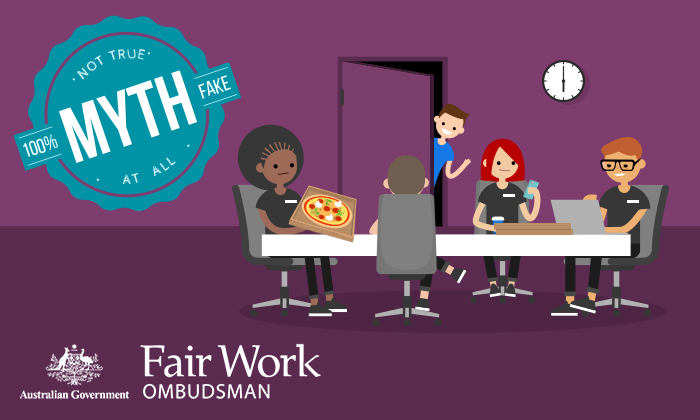Getting a job in Australia can be exciting – it’s a great way to learn about Australia, meet people and make some money while you study. While every workplace is different, remember, international students have the same workplace rights as all other workers in Australia.
When you start a new job there’s a lot to learn. The Fair Work Ombudsman (FWO) has some great information including handy facts to help you understand your rights at work. Watch a short video busting some common work myths and read on to find out more.
Myth 1: Paying low, flat rates of pay for all hours worked is OK if the worker agrees
Fact: Minimum lawful pay rates (minimum wages) are mandatory. In many jobs, penalty rates must be paid for evening, weekend, public holiday and overtime work. Calculate minimum rates using the Fair Work Ombudsman’s Pay Calculator.
Myth 2: Employees don’t need to be paid for time spent opening and closing.
Fact: Employees must be paid for all hours they work and this includes time spent opening or closing. For example, if an employee is required to be at work at 7:45 a.m. to prepare for an 8 a.m. opening, they need to be paid from 7:45 a.m.
Myth 3: Paying employees with goods such as food, drink or clothing is OK.
Fact: Payment-in-kind is against the law. Employees must be paid money for all work performed.
Myth 4: Employers can make deductions from an employee’s wages to cover losses arising from cash register discrepancies, breakages and customers who don’t pay.
Fact: Unauthorised deductions from an employee’s pay are unlawful. Deductions can be made only in very limited circumstances. Find out more at Deducting pay and overpayments.
Myth 5: Pay slips aren’t mandatory – employers only need to give employees pay slips if they ask for them.
Fact: Employers must give all employees a pay slip within one working day of pay-day. It doesn’t matter how many people the business employs, or how long an employee has been working there. Employers can give employees paper or electronic pay slips, such as a link sent via email.
Myth 6: Lengthy unpaid work trials and unpaid work placements and internships are OK for inexperienced young workers looking to get a foot in the door
Fact: Unpaid work trials must only last for as long as needed to demonstrate the skills required for the job. Depending on the nature of the work, this could range from an hour to one shift. Internships or unpaid work placements can be lawfully unpaid when they are part of an approved job training or work experience program or vocational placement and the work is done in accordance with the relevant program or placement. Read more on the FWO’s unpaid trials page.
Myth 7: Employees don’t need to be paid for time spent at meetings or training outside their work hours
Fact: If it is compulsory, then it is work. Employees are entitled to be paid for the time they are required to spend at any meeting or training.
Myth 8: Employers can pay young workers as ‘trainees’ or ‘apprentices’
Fact: Employers must negotiate and lodge a registered training contract for an employee to be able to lawfully pay trainee or apprentice rates. An employer cannot pay an employee trainee rates just because they are young or new to the job or because the employer feels like it. Read more about trainees and apprentices.
To help you understand your rights and responsibilities at work, the FWO and the Foundation for Young Australians teamed up to create a series of award-winning videos. You can check them out on the FWO’s YouTube channel.
You can also find more myths and tips for young workers and the Guide to Starting a New Job on the FWO’s website.
Remember, the FWO is here to help!





